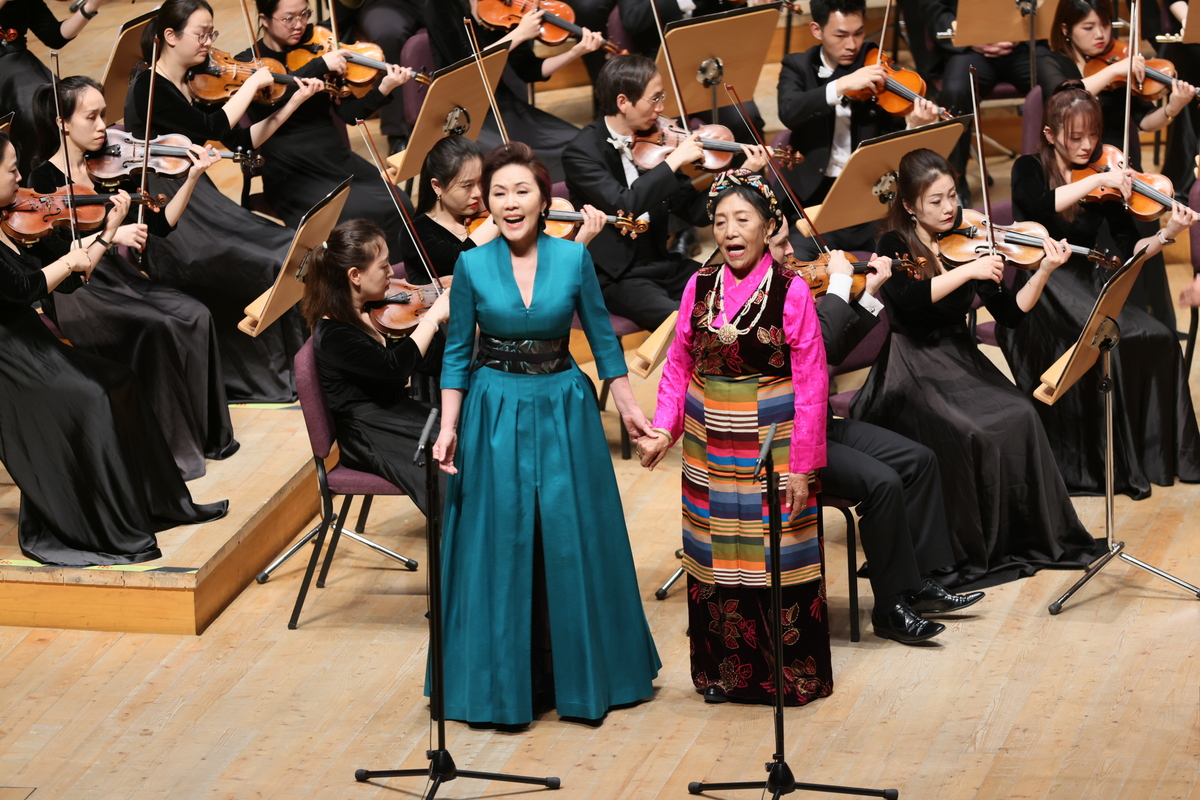Tibetan singer hails liberation
Updated: 2021-05-24 By CHEN MEILING in Beijing and DAQIONG in Lhasa (China Daily)  Print
Print 


 Tsedan Drolma (right) sings Sing a Folk Song for the Party with soprano Fang Qiong at the closing ceremony of the 37th Shanghai Spring International Music Festival in Shanghai on May 10. WANG XIANG/XINHUA
Tsedan Drolma (right) sings Sing a Folk Song for the Party with soprano Fang Qiong at the closing ceremony of the 37th Shanghai Spring International Music Festival in Shanghai on May 10. WANG XIANG/XINHUA
Song saluting region's reform brings serf-born soprano into spotlight
From nobody to somebody-a song can change a woman's life.
Tibetan singer, Tsedan Drolma, 84, picked up the microphone again at the closing ceremony of the 37th Shanghai Spring International Music Festival on May 10, with her performance receiving long-lasting applause. For her, this stage was where everything started.
Back in 1963, then a 26-year-old student at Shanghai Conservatory of Music, Tsedan Drolma was deeply moved by a new song-Sing a Folk Song for the Party-about how serfs suffering from oppression and distress stand up to fight under the leadership of the Communist Party of China.
Society in the Tibet autonomous region was controlled by feudal serfdom until the democratic reform led by the CPC liberated 1 million serfs in 1959. Born into a family of serfs, Tsedan Drolma remembered the harsh living environment, starving days, endless work and whippings from a young age.
"The song reminds me of many scary scenes of the old society. Without liberation, it would not have been possible for us to have today's happy life," she said, adding that she asked her teacher to teach her the song, to "expresses my gratitude and love to the Party and the country".
Since she was not good at Mandarin, it took about two months for her to learn the song. She made her debut at the 4th Shanghai Spring International Music Festival in 1963, and soon made a stir via radio broadcast. Her fame grew further after she gave a performance at a dancing show at the Great Hall of the People in Beijing in 1964.
Since then, the song has been appreciated and learned across the country, and it has come to be regarded as a classic in past decades. She was frequently invited to galas, concerts and TV programs, and also performed overseas, including in the United States, the United Kingdom, Germany, Japan and Austria.
"I have sung this song my whole life, and the emotions attached to it grow deeper and deeper," Tsedan Drolma said. "This year is very special as it celebrates the 100th anniversary of the Party. I am very willing to express my gratitude to the Party again on this special occasion."
Resting while recovering from an illness at a hotel in Beijing in mid-May, she recalled the first time she saw soldiers of the People's Liberation Army.
"Before they came, I heard rumors that they would live in our houses and ask us for money. But that was not the case. I saw them build sheds, fetch water from wells, cook and help cut wheat. Some of them showed symptoms of altitude sickness. They came to endure hardship while having everything back home, for the liberation of the Tibetan people, which was very moving," she said.
Tsedan Drolma added that she also came to see performances of the army's art ensembles and was inspired to be part of them. "I didn't know much about the Party, but I knew it worked to help people."
Tsedan Drolma remembered when she was 19 and, with some 40 young Tibetan men, was invited to visit other parts of China including Beijing, Shanghai, Wuhan, Tianjin and Harbin. "I didn't know China was so large! We visited factories and villages. At a farmer's house, we asked how much of his crops he needed to hand over. He said they kept everything, and we were shocked. We realized life should be like this."
She joined the PLA's art ensemble in her hometown Shigatse at the age of 20 and was enrolled in the class for ethnic groups at the Shanghai Conservatory of Music in 1958 due to her musical talent.
"Both my elder sisters had married, and my parents wanted me to stay with them, but I said I wanted to sing and go to Shanghai. The decision turned out to be life-changing," she said. "When I came back, many of my friends had become mothers of three to four children, and they said they regretted not going like me."
Besides music, the conservatory also taught academic knowledge. Tsedan Drolma didn't have to pay tuition, as she benefited from a local policy. "I will never forget those who offered me education and helped me grow. I am what I am because of them."
As she had already become famous and was very busy performing, her graduation was delayed four years to 1965. She even forgot to collect her graduation certificate until her employer asked for it. "I didn't know there was such a thing as a graduation certificate," she laughed.
Despite old age and illness, she expects to give a performance at the grand gala in Tibet this year as it celebrates the 70th anniversary of its peaceful liberation. She is now working with a local TV station to write a new song.
She received the "special recognition award" at the festival in May in honor of her contribution to modern Chinese music. Yang Xiaoyong, a baritone singer who also attended the event, told news website ThePaper.cn that he listened to Tsedan Drolma's songs on the radio as a child and was greatly impressed. "Singers should have their own characteristics, and she did. She is an idol to us," he added.








